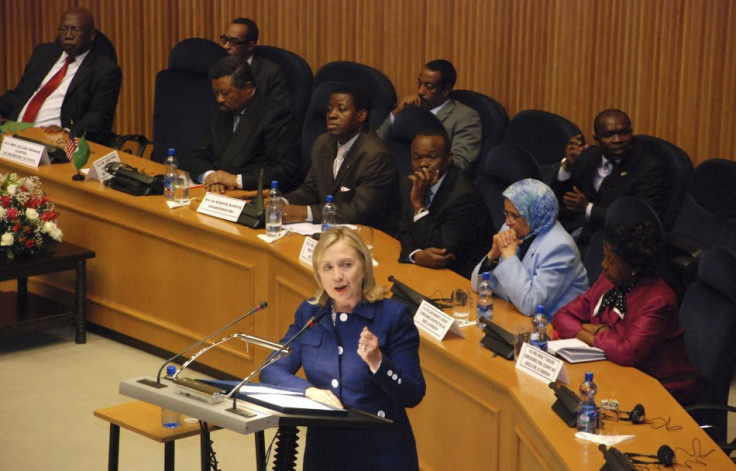Libya crisis: Why does Hillary Clinton plead for Africa to abandon Gaddafi?

US Secretary of State Hillary Clinton yesterday pressed all African states to demand the Libyan strongman Muammar Gaddafi step down and take tougher action against his regime.
In her speech, Mrs Clinton urged African countries to expel Gaddafi's diplomats and increase their support for the opposition, which at a time when Nato is being attacked by the US congress, the US Defence Secretary, the UK Navy Chief and the rebels themselves is quite understandable.
However, when she started emphasising on the fact that the words of African leaders, coupled with their actions, could help bring peace to Libya, her discourse turned into what sounded like a desperate attempt to find new allies willing to support the Nato operation in Libya.
"It is true that Gaddafi has played a major role in providing financial support for many African nations and institutions, including the AU," Clinton said in her speech at the AU's headquarters in Ethiopia's capital, Addis Ababa.
"But it has become clear that we are long past the time when he can remain in power."
"I urge all African states to call for a genuine ceasefire and to call for Gaddafi to step aside," she added.
She called on leaders to suspend the operations of Gaddafi's embassies in their countries, to expel pro-Gaddafi diplomats and to increase support for and contact with the National Transitional Council
"Your words and your actions could make the difference in bringing this situation to a close and allowing the people of Libya ... to get to work writing a constitution and rebuilding their country," she said.
Senegal and Gambia, Chad and Now Liberia are the only African states to have recognised the NTC as the legitimate interlocutor of the Libyan people, something the United States, Britain, Australia, France, Italy, Qatar and the United Arab Emirates have done.
Even after recognising the rebels however, the President of Senegal, Abdoulaye Wade, insisted Gaddafi would be welcome in the country if he decided to leave Libya.
If countries on the continent are prepar3ed to call for the Libyan leader's departure, it still seems unlikely they would agree to get any more involved than that.
Mrs Clinton also said the AU can help guide Libya through a transition to a new government "based on democracy, economic opportunity and security", a transition she said they describe in their own statements.
The lights in the conference room went out ten minutes or so into her speech but Clinton appeared unfazed and carried on in the dark saying: "when things like this happen, you just keep on going."
And it seems that she will have to keep on carrying lobbying for Gaddafi's departure if she wants other leaders in the continent to call for his him to step down.
The Libyan leader has many friends in Africa and was not shy to help them in adverse times. He also played a very active role in the African Union Itself and supported financially.
Many governments in Africa are also very suspicious of the West and fear they might be on the target list once Gaddafi is ousted. Moreover, in countries like Sudan, Somalia, the Republic Democratic of Congo, or Guinea Bissau have much more pressing problems than that of Gaddafi on the agendas.
On the other hand it is likely that countries such as Sierra Leone, Rwanda or even Cote D'Ivoire will prefer to stay focused on the reconstruction of their territory rather than to get involved in what they see as someone else's battle.
As the rebels have been accused of committing various racist actions towards sub-Saharan Migrant workers, as well as unlawfully imprisoning them and violating basic human rights in the process, it will take some time for African leaders to trust the National Transitional Council. While Gaddafi clearly was a pro-African unity politician, the rebels fighters also appear to be at the moment much more Western orientated.
Ms Clinton also praised Africans for increasingly taking on the responsibilities of solving Africa's own problems and crises, alluding to examples like the deployment of African peacekeeping forces in Somalia.
She referred to the role of the African Union and sub -regional organizations, which include SADC in southern Africa and ECOWAS in West Africa.
Instead of providing temporary aid, Ms Clinton said, the United States is now taking a different approach to promoting development in Africa by helping its economies grow to the point they can meet their own needs.
Her approach however sounded more imperialistic than anything else. Africa was a continent left in pieces after colonisation, as most countries did not have functioning institutions and the communities had been divided by colonial powers themselves. It sounds somehow a little condescending from her to applaud what Africans have attempted to do before and after colonialism.
Also, Mrs Clinton's comments drew harsh criticism from Democratic Representative Dennis Kucinich, a fierce critic of US involvement in the Libyan conflict who charged in a statement that she was "threatening" Africa.
"Africa is not an imperial holding of the United States," he scolded. "Africa should be left to make its own decisions about its dealings with Libya without undue pressure from the United States."
As she warned the leaders to help the US oust Gaddafi otherwise, "you will be on the wrong side of history and time will prove that" she has once again proven that the reduction of history into a ranking table dividing the friends and enemies of the US is still relevant.
On the contrary, the power of history is that proves that there is no bad guys and no good guys as such since the roles are interchangeable, unfortunately in the case of Africa, through time different oppressors have managed to abuse the people for far too long.
© Copyright IBTimes 2025. All rights reserved.





















